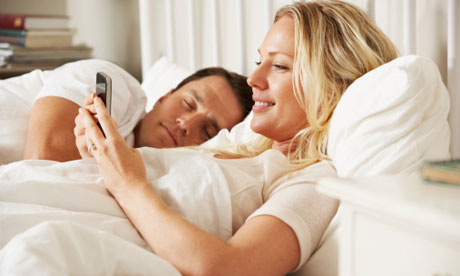
More than 80% of people with smartphones have them switched on all the time, including in bed. Mobiles or tablets often get used as alarm clocks, but once on the bedside table they're a terrible temptation for one final text or email after the light goes out.
Four out of 10 adults say they use their smartphone if it wakes them. But even if your device doesn't go off it may disrupt your sleep. A small study of tablets (used by 13 volunteers aged 20) from the Rensselaer Polytechnic Institute in New York found that exposure to light from these sources suppresses the body's melatonin levels by 23% when used for two hours before bedtime. The authors speculated that since melatonin levels reflect how dark it is outside and tell the body how ready it should be for sleep, tablets may contribute to insomnia.
The Emory sleep disorders laboratory in America advises not using a tablet before bed, even just to read, because the light shines directly into your eyes – if you read with a lamp, the light points down. Last week research from the Mayo Clinic in Arizona, published in the journal Sleep, suggested, not at all radically, that turning down the light on these devices could reduce melatonin suppression and improve sleepiness. So can you stack your mobile devices back on your bedside table after all?
The solution
Tablets and smartphones are backlit with a light-emitting diode (LED). The authors of the Mayo research say that devices that emit light at levels higher than 30 lux may reduce melatonin release.
They found that if the mobile phone and tablets were held 14in away from the eye at maximum brightness, only the iPhone3 was over the 30 lux emission. So if you turned the lights down and held the devices closer you'd be OK – at the lowest setting, up against the face, the iPhone4 measured 8 lux.
However, it isn't just about a drop in melatonin levels. Doing anything stimulating before bed – reading with a light in your face, answering emails – increases insomnia. Good sleep hygiene means relaxing in a dark room without noise. There is some evidence that LEDs themselves are more likely to reduce melatonin through emitting more blue light.
Other studies have shown that using mobile phones and computers too much – however much that is, and wherever it is done – causes disturbed sleep and depression, especially in young people.
Being accessible all the time may not be as great as we think it is. And we should probably be more selective about how much of the outside world gets into our bedrooms.

